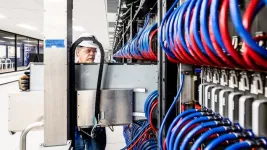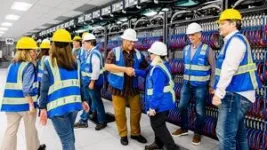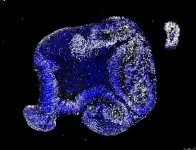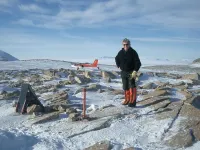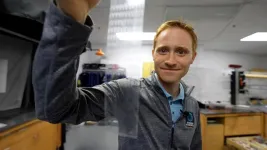(Press-News.org) The installation of Aurora’s 10,624th and final “blade” marked a major milestone for the highly anticipated exascale supercomputer at the U.S. Department of Energy’s (DOE) Argonne National Laboratory.
After years of diligent work and planning, the system now contains all the hardware that will make it one of the most powerful supercomputers in the world when it is opened up for scientific research. Built by Intel and Hewlett Packard Enterprise (HPE), Aurora will be theoretically capable of delivering more than two exaflops of computing power, or more than 2 billion billion calculations per second.
“We’re looking forward to putting Aurora through its paces to make sure everything works as intended before we turn the system over to the broader scientific community.” — Susan Coghlan, ALCF project director for Aurora
The Aurora team has been building the system piece by piece over the last year and a half, installing blades and other components as they were delivered to the Argonne Leadership Computing Facility (ALCF), a DOE Office of Science user facility.
View related video here.
“We have been living and breathing the Aurora installation since the first pieces were delivered in November of 2021,” said Susan Coghlan, ALCF project director for Aurora. “While we still have a lot of work to do before we can roll the system out to scientists worldwide, it is incredibly exciting to have the final hardware in place.”
As the backbone of the system, Aurora’s blades are sleek rectangular units that house its processors, memory, networking and cooling technologies. The machine gets its computational muscle from a combination of state-of-the-art Intel CPUs (central processing units) and GPUs (graphics processing units). Each blade is equipped with two Intel Xeon CPU Max Series processors and six Intel Data Center GPU Max Series processors.
With each blade weighing in at around 70 pounds, the team needed a specialized machine to delicately install the units vertically into Aurora’s refrigerator-sized racks. Each of the system’s 166 racks contains 64 blades. The racks are spread out across eight rows, occupying the space of two professional basketball courts in the ALCF data center.
Before the system could be installed, Argonne had to carry out some major facility upgrades. This included adding new data center space to provide enough room for the supercomputer and building mechanical rooms and equipment to provide increased power and cooling capacity.
Now that the machine is fully assembled, researchers from the ALCF’s Aurora Early Science Program and DOE’s Exascale Computing Project will move their work to Aurora to begin scaling their applications on the full system. For the past few months they’ve been working on the Sunspot testbed, which is a test and development system that has the exact same architecture as Aurora but only on two racks. These early users help to stress test the supercomputer and identify potential bugs that need to be resolved ahead of its deployment.
“We’re looking forward to putting Aurora through its paces to make sure everything works as intended before we turn the system over to the broader scientific community,” Coghlan said.
The Argonne Leadership Computing Facility provides supercomputing capabilities to the scientific and engineering community to advance fundamental discovery and understanding in a broad range of disciplines. Supported by the U.S. Department of Energy’s (DOE’s) Office of Science, Advanced Scientific Computing Research (ASCR) program, the ALCF is one of two DOE Leadership Computing Facilities in the nation dedicated to open science.
Argonne National Laboratory seeks solutions to pressing national problems in science and technology. The nation’s first national laboratory, Argonne conducts leading-edge basic and applied scientific research in virtually every scientific discipline. Argonne researchers work closely with researchers from hundreds of companies, universities, and federal, state and municipal agencies to help them solve their specific problems, advance America’s scientific leadership and prepare the nation for a better future. With employees from more than 60 nations, Argonne is managed by UChicago Argonne, LLC for the U.S. Department of Energy’s Office of Science.
The U.S. Department of Energy’s Office of Science is the single largest supporter of basic research in the physical sciences in the United States and is working to address some of the most pressing challenges of our time. For more information, visit https://energy.gov/science.
END
Argonne installs final components of Aurora supercomputer
The new exascale machine is one step closer to enabling transformative science
2023-06-22
ELSE PRESS RELEASES FROM THIS DATE:
Being able to tell parents about sexuality plays important role in mental health of Black sexual minority men and transgender women
2023-06-22
Black sexual minority men (BSMM) and transgender women (BTW) face racial and sexuality-based discrimination, and disproportionately high depression compared to Black heterosexual men and Black cisgender women, respectively. Though previous studies have demonstrated the relationship between discrimination and depression among racial and sexual minorities, few studies explore the extent to which openness with parents impacts this relationship.
A new study by College of Public Health Assistant Professor Rodman Turpin found that sexual identity ...
Transforming Anthropology joins the University of Chicago Press journals program in 2024
2023-06-22
We are honored to announce that Transforming Anthropology will join the University of Chicago Press journals program beginning in 2024 (vol. 32, no. 1). Transforming Anthropology is the flagship journal of the Association of Black Anthropologists (ABA), which is a section of the American Anthropological Association (AAA). All 8,000+ members of the AAA receive online access to Transforming Anthropology through their membership, and that benefit will continue in this new partnership.
“Thanks to the vision and dedication of our editor, Aisha Beliso-De Jesús, the journal will maintain its tradition of supporting and nurturing ...
Lehigh Industrial Assessment Center to expand into regional energy audit, workforce development role
2023-06-22
The Lehigh University Industrial Assessment Center (IAC) will expand into the Mid-Atlantic Regional IAC Center of Excellence (MARICE) with newly awarded funding from the U.S. Department of Energy (DOE).
Lehigh’s IAC was established in 2001 as part of the DOE’s nationwide Industrial Assessment Center Program to reduce energy and waste and enhance productivity for manufacturing plants in Pennsylvania, New Jersey, and New York. The center, which was most recently renewed in 2021, is led by mechanical engineering and mechanics (MEM) faculty Professor Alparslan ...
Stem cell model of human brain development suggests embryonic origins of Alzheimer’s disease
2023-06-22
Alzheimer's disease (AD) mainly affects the older population. Recent research found early disease signs in cell culture models of early human brain development, raising the possibility that the disease has its origins much earlier in life, possibly during embryogenesis – the formation and development of an embryo.
Alzheimer’s disease is a highly prevalent, debilitating, and potentially fatal neurodegenerative disease with limited treatment options. Patients are typically diagnosed at an advanced disease stage, limiting the possibilities for early therapeutic intervention. Although for most patients ...
Chronic stress-related neurons identified
2023-06-22
Researchers at Karolinska Institutet in Sweden have identified a group of nerve cells in the mouse brain that are involved in creating negative emotional states and chronic stress. The neurons, which have been mapped with a combination of advanced techniques, also have receptors for oestrogen, which could explain why women as a group are more sensitive to stress than men. The study is published in Nature Neuroscience.
Just which networks in the brain give rise to negative emotions (aversion) and chronic stress have long been unknown to science.
By using ...
Highest honor in Antarctic exploration goes to Ian Dalziel
2023-06-22
Ian Dalziel of The University of Texas at Austin has been honored with the Polar Medal — the United Kingdom’s top award for polar exploration. The medal recognizes Dalziel’s contributions to Antarctic geology, including discoveries about the icy continent’s ancient past and the fragility of its ice sheet today. The award will be presented by King Charles III at Buckingham Palace later this year.
Early recipients of the medal, which has existed for more than 150 years, include pioneers of polar exploration Capt. R.F. Scott and Sir Ernest Shackleton, who made the first attempt to reach the South Pole in 1902. Dalziel’s ...
Stronger tape engineered through the art of cutting
2023-06-22
Adhesive tape fulfills many purposes, from quickly fixing household appliances to ensuring a reliable seal on a mailed package. When using tape with a strong bond, removing it may only be possible by scraping and prying at the tape's corners, hoping desperately that surface pieces don’t tear away with the tape.
But what if you could make adhesives both strong and easily removable? This seemingly paradoxical combination of properties could dramatically change applications in robotic grasping, wearables ...
Plant-based food packages linked to reduced BMI in children
2023-06-22
A new study led by researchers from the Mass General Brigham healthcare system suggests that taking a “food is medicine” approach could increase nutrition security for families and lead to reductions in body mass index (BMI) in children. Working together with the MGH Food Pantry, researchers from the Massachusetts General for Children and Boston Children’s Hospital examined whether providing weekly plant-based foods to families seeking food assistance during the pandemic led to weight changes among children.
The team found an association between increasing receipt of food packages and decreased BMI. The findings, published ...
Rethink funding by putting the lottery first
2023-06-22
The allocation process of funding to researchers is far from optimal. A recent project of the Open Science Initiative at the University of Lübeck (Germany) has put forward a new proposal to challenge and rethink the funding system. This proposal by researchers from Lübeck University, Humboldt University Berlin, the Academy of Fine Arts Munich, and the Max Planck Institute for Research on Collective Goods in Bonn involves an initial lottery determining which researchers can submit funding applications in a ...
Flooding tackled by helping citizens take action – study
2023-06-22
Extreme weather caused by climate change - such as flooding - will be to easier to prepare for after scientists developed a new method that empowers citizens to identify solutions to the threats their communities face.
The approach works by researchers bringing community groups together to discuss and understand the likely impacts of climate change in a local area. In the UK, these include indirect risks such as food shortages and energy disruption as well as physical threats like heat stress and flooding.
Most climate adaptation initiatives are developed by governments or by businesses, rather than to help citizens help themselves. The new approach, published ...
LAST 30 PRESS RELEASES:
ASU researchers to lead AAAS panel on water insecurity in the United States
ASU professor Anne Stone to present at AAAS Conference in Phoenix on ancient origins of modern disease
Proposals for exploring viruses and skin as the next experimental quantum frontiers share US$30,000 science award
ASU researchers showcase scalable tech solutions for older adults living alone with cognitive decline at AAAS 2026
Scientists identify smooth regional trends in fruit fly survival strategies
Antipathy toward snakes? Your parents likely talked you into that at an early age
Sylvester Cancer Tip Sheet for Feb. 2026
Online exposure to medical misinformation concentrated among older adults
Telehealth improves access to genetic services for adult survivors of childhood cancers
Outdated mortality benchmarks risk missing early signs of famine and delay recognizing mass starvation
Newly discovered bacterium converts carbon dioxide into chemicals using electricity
Flipping and reversing mini-proteins could improve disease treatment
Scientists reveal major hidden source of atmospheric nitrogen pollution in fragile lake basin
Biochar emerges as a powerful tool for soil carbon neutrality and climate mitigation
Tiny cell messengers show big promise for safer protein and gene delivery
AMS releases statement regarding the decision to rescind EPA’s 2009 Endangerment Finding
Parents’ alcohol and drug use influences their children’s consumption, research shows
Modular assembly of chiral nitrogen-bridged rings achieved by palladium-catalyzed diastereoselective and enantioselective cascade cyclization reactions
Promoting civic engagement
AMS Science Preview: Hurricane slowdown, school snow days
Deforestation in the Amazon raises the surface temperature by 3 °C during the dry season
Model more accurately maps the impact of frost on corn crops
How did humans develop sharp vision? Lab-grown retinas show likely answer
Sour grapes? Taste, experience of sour foods depends on individual consumer
At AAAS, professor Krystal Tsosie argues the future of science must be Indigenous-led
From the lab to the living room: Decoding Parkinson’s patients movements in the real world
Research advances in porous materials, as highlighted in the 2025 Nobel Prize in Chemistry
Sally C. Morton, executive vice president of ASU Knowledge Enterprise, presents a bold and practical framework for moving research from discovery to real-world impact
Biochemical parameters in patients with diabetic nephropathy versus individuals with diabetes alone, non-diabetic nephropathy, and healthy controls
Muscular strength and mortality in women ages 63 to 99
[Press-News.org] Argonne installs final components of Aurora supercomputerThe new exascale machine is one step closer to enabling transformative science
